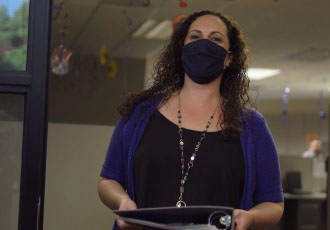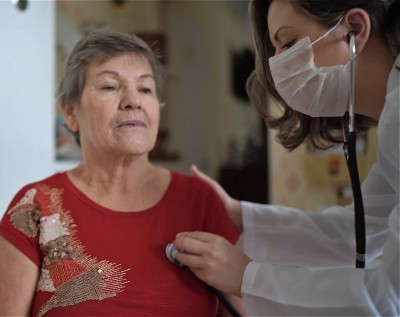Continuous Care Nurses Make a Difference Day and Night
At first, caring for veterans may not seem like it would lend itself to a career in hospice nursing.
Nothing could be further from the truth.
Lori Stewart, a licensed vocational nurse (LVN), started her nursing career some 20 years ago, caring for veterans at the San Diego VA Medical Center.
Because each person was different, and their combat experiences were different, Lori learned to practice compassion and adapt to each patient’s needs.
“You have to gain their trust,” she says. “You have to show the patient that you are kind and you're not going to hurt them, but you also have to have the trust of the family. That starts when you walk in the door.”
Those skills were important to her success in her previous role—and they have proved critical to the work she has done as a VITAS Healthcare hospice nurse in San Diego for the last 11 years.
The Role of a VITAS Continuous Care Nurse
After taking a break from nursing to raise her kids, Lori learned about hospice nursing, and VITAS specifically, from a friend.
Today, as an Intensive Comfort Care® (ICC) LVN, Lori helps provide around-the-clock care to patients who are dealing with more serious issues, such as trouble breathing and uncontrolled pain. It’s a role that requires patience, commitment, and compassion.
I’ve learned that I can do so many things I never expected to be able to do.
“Compassion is everything,” Lori says. “You have to be present with this human being and try to understand the world from their perspective. And you have to listen. You have to meet them where they are.”
The care team members—physicians, nurse practitioners, home health aides (HHAs), social workers, and chaplains—work together to determine care plans, but often the LVN role is fairly autonomous.
“You have to build the confidence to work on your own. You can't run to the nurse’s station. You have to learn where your resources are, and you have to believe in what you're doing,” Lori says. “I’ve learned that I can do so many things I never expected to be able to do.”
Practicing Active Listening, Building Trust
In her role, Lori finds fulfillment caring for patients while giving family members a welcome break.
“We come and help take care of patients and teach family members how to take care of them,” she says. “We tell them it’s OK to go to sleep. We also help them understand what they can and cannot accomplish.”
Educating family members about the goals of hospice is important. “Our goal is not to prolong this person's life. I make sure the families know our goal is not to end this life either,” she adds. “That's a misunderstanding that comes up constantly.”
It comes back to building that trust from the start—showing respect and practicing active listening.
“I knock on the door,” she says. “I don't just push the door open. I introduce myself. I make sure my badge is out there where they can see it. I let them talk and I just follow along.”
The work is fulfilling and important. “These are people at probably the most vulnerable moments in their life,” Lori says. “They're afraid, and they don't know what to expect. It gives me a lot of satisfaction to be able to show them compassion. I learn from patients all the time.”
Are you looking for a career as a Hospice Nurse?

The VITAS Employee Promise
Behind every patient success story at VITAS—every last wish fulfilled, every loving memory made—is a team of compassionate, expert professionals doing their best to make a difference.
How VITAS Supports Our Employees Sign Up for Career News
